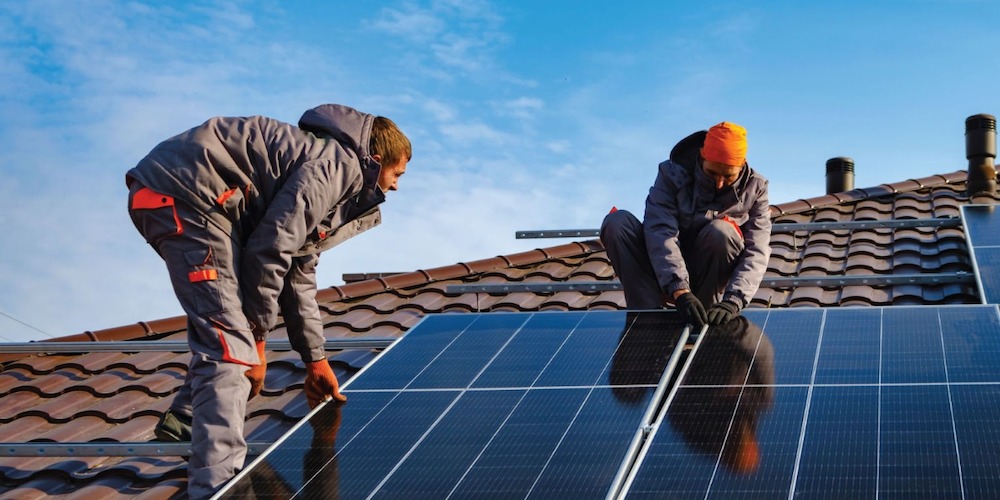Just How to Choose the Right Solar Energy Installation for Your Power Demands
Picking a suitable solar power setup needs a methodical approach that starts with a clear understanding of your power consumption patterns and anticipated future demands. Variables such as the kind of solar innovation, installation expenses, and readily available motivations play essential functions in making an educated choice.
Assess Your Energy Demands
Analyzing your power requires is a critical initial action in the solar power installment process. Comprehending your present and future energy usage will direct the design of an effective solar system customized to your requirements.
Think about seasonal variants in energy intake, as certain months might require even more power because of home heating or cooling requirements. Furthermore, assess any type of planned modifications in way of living or home, such as the acquisition of electrical lorries or home growths, which might enhance your energy needs in the future.
Once you have an extensive understanding of your power intake, you can identify the proper solar capacity required to fulfill those requirements. This analysis not only aids in sizing the solar installation but additionally notifies choices concerning power storage space services and potential grid connection needs. solar photovoltaic. Ultimately, precisely evaluating your power requires ensures that your solar energy system operates efficiently, providing the advantages of renewable resource in alignment with your intake patterns

Evaluate Solar Modern Technology Options
When taking into consideration a solar power setup, it is necessary to assess the different solar technology choices readily available to make certain the system lines up with your energy demands and budget plan. The key innovations include monocrystalline, polycrystalline, and thin-film solar panels, each offering distinctive benefits and disadvantages.
Monocrystalline panels are recognized for their high effectiveness and efficiency in limited space, making them appropriate for domestic installments with much less roof location. Thin-film solar panels are lightweight and adaptable, optimal for non-traditional surface areas, yet they typically have lower effectiveness and call for even more area to produce the exact same energy output.
Along with panel types, consider solar inverters, which convert the direct current generated by the panels right into rotating current for home use. String inverters, microinverters, and power optimizers each have special benefits that can impact system performance. Reviewing these options will assist you make an educated choice that fulfills your power demands properly.
Consider Installment Costs
Recognizing installation expenses is vital for anyone taking into consideration a solar energy system. These costs can vary considerably based on numerous variables, consisting of system size, kind of panels, and installment intricacy. A common domestic solar installation may range from $15,000 to $30,000 prior to incentives, which can be a considerable in advance investment.
To accurately analyze setup prices, it is vital to obtain detailed quotes from multiple solar carriers. These quotes should break down the costs of devices, labor, allows, and any kind of additional devices required for the installment. Pay attention to the quality of materials being offered, as higher-quality panels and inverters can lead to much better performance and durability, potentially balancing out higher initial costs.
Furthermore, consider the long-term effects of installation expenses. A cheaper installment could save money in advance yet could result in higher upkeep costs or reduced power manufacturing in time. It is additionally suggested to evaluate funding alternatives, such as solar financings or leases, which can influence your overall monetary commitment.
Research Resident Rewards
Exploring local motivations can significantly affect the total cost of a solar energy installation. Numerous areas provide a selection of economic motivations targeted at promoting renewable power usage, making solar energy more obtainable and budget-friendly for home owners and companies alike.
These incentives may consist of federal tax credit scores, state discounts, and regional energy company programs that offer cash money rewards or net metering choices. The Federal Investment Tax Credit History (ITC) enables you to deduct a substantial portion of your solar setup expenses from your government tax obligations. State-specific motivations can additionally boost these savings, typically in the form of straight money discounts or tax credit reports.
Additionally, some city governments might use residential property tax exemptions for solar installments, ensuring that your financial investment does not raise your real estate tax responsibility. Looking into these motivations can reveal considerable financial savings, which can influence your decision on the size and type of solar system check that to set up.

Pick a Trustworthy Installer
Choosing a respectable installer is vital to making sure the success and longevity of your solar power system. The setup process significantly impacts the performance and performance of your solar panels, making it essential to choose a specialist with a tried and tested track document.
Next, confirm the installer's credentials, including licenses, qualifications, and insurance coverage. A trustworthy installer should hold accreditations from acknowledged organizations, such as the North American Board of Qualified Energy Professionals (NABCEP), indicating a high degree hop over to here of knowledge. Furthermore, ask about the installer's experience with similar tasks, especially in your location, as regional climate and laws can affect setup techniques.
Demand multiple quotes and contrast them not only on rate however also on the high quality of equipment and service warranties provided. A credible installer needs to provide clear information about their items and services, helping you make an educated decision. By investing time in choosing a trustworthy installer, you will improve the overall performance and durability of your solar energy system.
Conclusion
To conclude, selecting the suitable solar power installation demands a comprehensive analysis of energy demands, an understanding of readily available solar technologies, and a cautious factor to consider of installment expenses. Checking out regional rewards can enhance economic advantages, while picking a credible installer makes sure high quality craftsmanship and integrity. solar photovoltaic. By methodically evaluating these factors, people can accomplish an optimal solar solution that visit the site satisfies both current and future power demands, inevitably adding to sustainable energy practices and cost financial savings with time